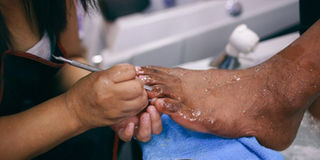Is your salon a health hazard waiting to happen?

Dr Ogwang advises salon owners to start a culture where equipment such as towels, clippers and shaving machines are sterilised after being used on each customer. Net Photo
What you need to know:
- Are you observant when combs, scissors, or other equipment are used on you? Imagine how many people use the same salon every minute and that same equipment. As a customer, you must be vigilant and demand for clean and sterilised equipment.
A barber uses a stained face towel to clean a man’s face after a shave. There are only two face towels hanging on nails across the wall and because of this, the barber uses one to clean the faces of at least five customers. This is an observation this writer made on a fact finding mission on hygiene and sanitation at one of the salons in Kampala.
Whereas a number of Ugandans look up to salons for grooming and beauty, one may wonder whether salon equipment such as scissors, face towels, shaving machines and combs among others are clean enough or pose a health risk.
According to Dr Edward Ogwang, a dermatologist at Skin Specialist Clinic in Wandegeya, when you go to the salon, a number of things happen that involve most of your body parts.
“Since your whole body surface is involved, if equipment such as combs, clips, caps, towels, bowels for scrubbing people’s feet, brushes and nail cutters are not cleaned properly, then infections can spread from one person to another,” he says.
The risk
Dr Ogwang says since there is sharing of combs, a number of customers are exposed to scalp ringworms, which are circular marks on the skin, often with flat centers and raised borders.
Also called Tinea capitis, this infection affects your scalp and hair shafts, causing small patches of itchy, scaly skin. He adds that infestations such as head lice could easily spread while bacterial infections around hair follicles can cause pus and painful bumps on the head.
“Sharing unhygienic towels can also cause fungal and viral infections such as herpes, and ringworm,” he says adding: “If your feet are scrubbed and you later get scaly feet, this is a sign of a fungus infection. However, moistened environments can also cause typical micro bacteria, which can hide in water bowels where people soak their feet thereby causing wounds and sores on the feet.
Fake products
Phiona Berempya, the manager at “Da” Unique Creations Parlour in Wandegeya, says people who want to save money are susceptible to salons that use fake relaxers.
She adds that it is easy for dandruff to spread from one customer to the next since things such as combs and rollers are usually not cleaned before being used on another customer.
Birempye advises salon employees to thoroughly wash and sterlise combs and other equipment before using it on someone else.
Preventive measures
Dr Ogwang advises salon owners to start a culture where equipment such as towels, clippers and shaving machines are sterilised after being used on each customer.
“Hair that falls after shaving must thoroughly be cleaned off the floor regularly. Seats must be wiped with disinfectants because they get dirty with germs due to high traffic. The wash basins where people soak their feet need to be scrubbed with bleach after every client,” Dr Ogwang explains.
He warns against clients walking barefoot in salons because clipped nails also carry fungus infections. He adds that salons that require people to take off their shoes must provide sandals.
Dr Ogwang says dipping a towel in hot water after use is not enough. The basic principles of sterilising requires that a towel must be sterilised at certain temperature for a certain duration of time, usually 45 minutes. He says such standards are also practiced in hospitals where towels are soaked, bleached, then dried and sterilised.
“Salon workers should be well dressed, well kempt and also disinfect their hands after each client. A salon must also have basic hygiene requirements including bleach, detergents, disinfectants, a sterilizer, mops for washing and cleaning, scrubs and brushes,” he says.
Berempya notes that the hygiene policy for workers at her salon is to wear closed shoes with stockings for women as well as maintain their hair neat. She advises those intending to visit any salon to pay keen interest on hygiene and if found wanting, to look for another salon. She also advises clients to stick to a salon they are comfortable with and have grown to trust.
“Most importantly, before a relaxer is used on you, check its expiry date and colour. Hair relaxers are formulated with a chemical called sodium hydroxide, which has a shelf life of one to 1.5 years. A client may be harmed by the use of an expired relaxer if bacterial growth occurs in the product,” she says.




